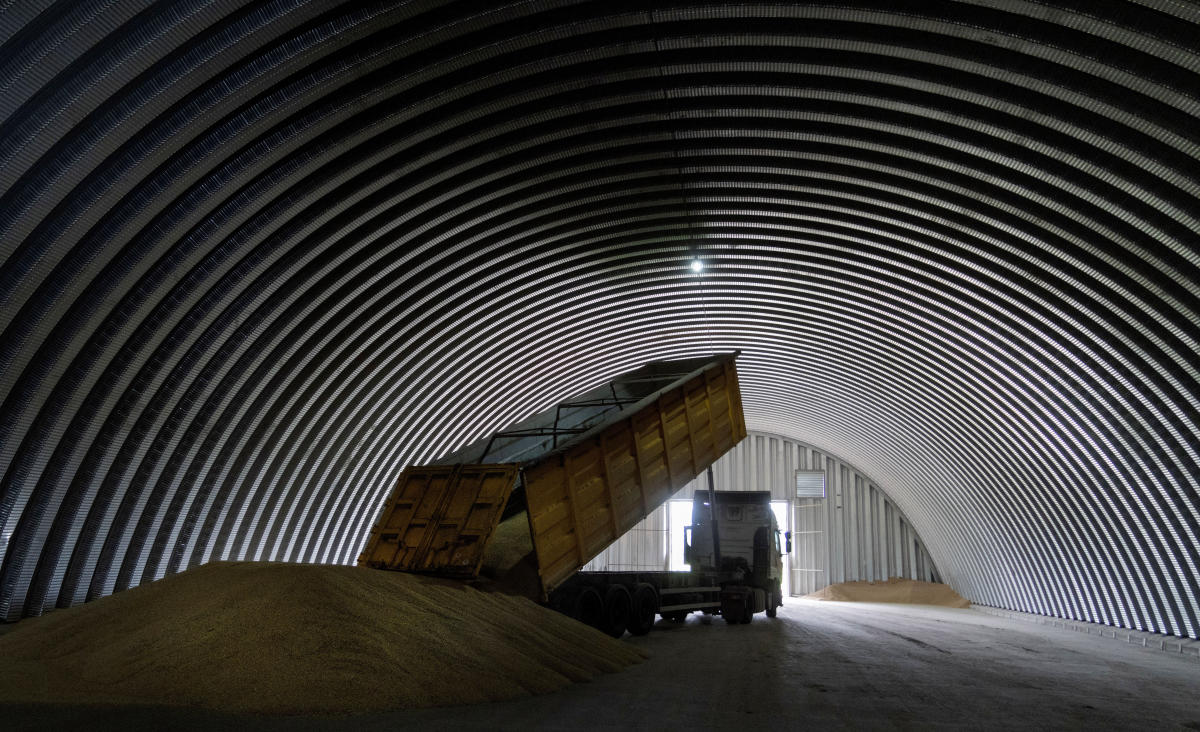
ANKARA, Turkey (AP) — A wartime agreement that allowed grain exports from Ukraine to resume and helped temper rising global food prices will be extended by 120 days, the United Nations and other parties to the deal said Thursday.
The initiative established a safe shipping corridor in the Black Sea and inspection procedures to address Russian and Ukrainian concerns that cargo vessels traveling off Ukraine’s southern coast might carry weapons or launch attacks.
The deal that Ukraine and Russia signed in separate agreements with the U.N. and Turkey on July 22 was due to expire Saturday. Russia confirmed the extension but said it expected progress on removing obstacles to the export of Russian food and fertilizers.
The news that the deal would continue came amid a new barrage of Russian airstrikes that smashed into Ukraine’s energy infrastructure, apartment buildings and an industrial site. At least four people were killed and 11 others wounded in drone and missile strikes around the country, authorities said Thursday.
Ukrainian President Volodymyr Zelenskyy called the extension a “key decision in the global fight against the food crisis.” U.N. Secretary-General Antonio Guterres and Turkish President Recep Tayyip Erdogan welcomed the renewal of the four-month-old deal.
“I was deeply moved to know that in Istanbul, Turkey, Ukraine, Russia and the U.N. had come to an agreement for the rollover of the Black Sea Grain Initiative, allowing for the free exports of Ukrainian grains,” Guterres said in a video statement.
The Turkish defense ministry said the decision to extend the deal came after two days of talks in Istanbul between delegations from Turkey, Russia, Ukraine and the U.N. that were held in a “positive and constructive” atmosphere.
The sides also discussed possible additional measures to “deliver more grain to those in real need,” the ministry added, to apparently address Russian complaints that most of the grain has ended up in richer nations.
Russia had voiced dissatisfaction with the part of the agreement aimed at facilitating exports of Russian grain and fertilizer, hinting that it might not agree to an extension. Although Western sanctions against Russia for its invasion of Ukraine did not target food exports, many shipping and insurance companies were reluctant to deal with Moscow.
Guterres said the U.N. was “fully committed” to removing hurdles to shipping food and fertilizer from Russia.
The Russian Foreign Ministry said Moscow had allowed the extension to take effect “without any changes in terms and scope” of its agreement. The ministry said Russia noted the “intensification” of U.N. efforts to hasten Russian exports.
“All these issues must be resolved within 120 days for which the ‘package deal’ is extended,” the ministry said.
Markets were pleasantly surprised by the extension, though it’s only for a few months instead of a year, said Ian Mitchell, co-director of the Europe program at the Center for Global Development who specializes in agriculture and food security.
“Ukraine and Russia are such important grain exporters that the rest of the market can’t fully substitute for the complete absence of Ukrainian grain,” he said. “So that deal is going to matter to food prices significantly, even if the volumes are not what they were before the invasion.”
He said, however, that the uncertainty is “unhelpful in this deal.” Toward the end of the four-month extension, markets will “price in the risk that it wasn’t extended, and prices will rise a little bit again.”
Following the announcement, wheat futures prices dropped 2.6% in Chicago.
Moscow briefly suspended its participation in the deal in late October, citing risks to its ships following what it alleged was a Ukrainian drone attack on Russia’s Black Sea Fleet. Ukraine did not claim responsibility for the attack.
Ukraine and Russia are major global exporters of wheat, barley, sunflower oil and other food to developing countries. A loss of those supplies following Russia’s Feb. 24 invasion of Ukraine had pushed up global food prices and fueled concerns of a hunger crisis in poorer countries.
Global food prices declined about 15% from their March peak after the grain initiative was adopted in July.
“With the delivery of more than 11 million tons of grains and foodstuffs to those in need via approximately 500 ships over the past four months, the significance and benefits of this agreement for the food supply and security of the world have become evident,” Turkey’s Erdogan said.
__
Associated Press writers Jamey Keaten in Geneva and Courtney Bonnel in London contributed.
___
Follow AP’s coverage of the war in Ukraine: https://apnews.com/hub/russia-ukraine




